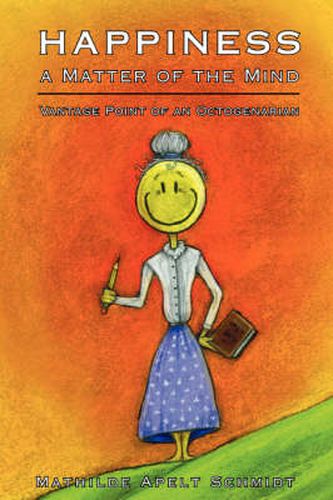Readings Newsletter
Become a Readings Member to make your shopping experience even easier.
Sign in or sign up for free!
You’re not far away from qualifying for FREE standard shipping within Australia
You’ve qualified for FREE standard shipping within Australia
The cart is loading…






This title is printed to order. This book may have been self-published. If so, we cannot guarantee the quality of the content. In the main most books will have gone through the editing process however some may not. We therefore suggest that you be aware of this before ordering this book. If in doubt check either the author or publisher’s details as we are unable to accept any returns unless they are faulty. Please contact us if you have any questions.
In this self-help book, Schmidt hands out practical advice and common sense ideas about happiness, with the benefit of hindsight. Schmidt expresses many of her main ideas through discussion of movies, books, theater, opera and poetry, but her primary source of inspiration is the Bible. The author alternates between thoughtful prose and illustrative stories to share her message of the keys to happiness. Chapters center on Christian values, punctuated by Schmidt’s examples from literature or vignettes from her own life. Occasionally she includes sweeping, unsubstantiated generalizations such as, “Sleeplessness is often caused by lies and unkind things you said to others,” or “Chubby people tend to be more jovial, easy-going, and happier” or “Happy families always seem to have time to enjoy a friendly cup of coffee with neighbors, to call their family members for a chat, and to play with their children and pets.” While some of these statements make only brief appearances, the author is fond of repeating one particular point-“A truly happy person has some kind of religion.” Schmidt is well read and includes copious references for readers who are interested in following up on certain points. Her love of theater and the arts is evident, adding an interesting element to the straightforward, conversational text. She is also careful to explain her literary references, so that quotes from Goethe, German poet Friedrich von Schiller, Kant, Pushkin and the like are useful even to readers unfamiliar with their work. Schmidt was not always happy and views happiness as something worth striving for. Her approach is that happiness can be taught, though a great deal of perseverance is needed to achieve it. A predictable, superficial approach to the frantic search for happiness.-Kirkus Discoveries
$9.00 standard shipping within Australia
FREE standard shipping within Australia for orders over $100.00
Express & International shipping calculated at checkout
This title is printed to order. This book may have been self-published. If so, we cannot guarantee the quality of the content. In the main most books will have gone through the editing process however some may not. We therefore suggest that you be aware of this before ordering this book. If in doubt check either the author or publisher’s details as we are unable to accept any returns unless they are faulty. Please contact us if you have any questions.
In this self-help book, Schmidt hands out practical advice and common sense ideas about happiness, with the benefit of hindsight. Schmidt expresses many of her main ideas through discussion of movies, books, theater, opera and poetry, but her primary source of inspiration is the Bible. The author alternates between thoughtful prose and illustrative stories to share her message of the keys to happiness. Chapters center on Christian values, punctuated by Schmidt’s examples from literature or vignettes from her own life. Occasionally she includes sweeping, unsubstantiated generalizations such as, “Sleeplessness is often caused by lies and unkind things you said to others,” or “Chubby people tend to be more jovial, easy-going, and happier” or “Happy families always seem to have time to enjoy a friendly cup of coffee with neighbors, to call their family members for a chat, and to play with their children and pets.” While some of these statements make only brief appearances, the author is fond of repeating one particular point-“A truly happy person has some kind of religion.” Schmidt is well read and includes copious references for readers who are interested in following up on certain points. Her love of theater and the arts is evident, adding an interesting element to the straightforward, conversational text. She is also careful to explain her literary references, so that quotes from Goethe, German poet Friedrich von Schiller, Kant, Pushkin and the like are useful even to readers unfamiliar with their work. Schmidt was not always happy and views happiness as something worth striving for. Her approach is that happiness can be taught, though a great deal of perseverance is needed to achieve it. A predictable, superficial approach to the frantic search for happiness.-Kirkus Discoveries